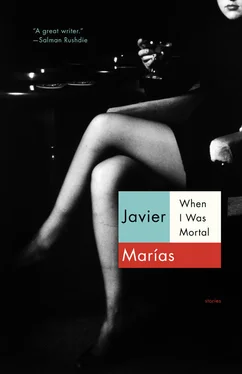But it was not a good season for his team despite that game or perhaps because of it, and the season after that was disastrous. Szentkuthy seemed bored, he barely scored any goals and only played occasionally, he was injured in January and didn’t recover for the whole of the rest of the championship, he hardly appeared at all.
On one occasion I was invited to watch a game from the President’s box, and Szentkuthy happened to be sitting to my left; on his left was a young woman with a rather old-fashioned look about her, I heard them speaking in Hungarian, at least I assumed it was Hungarian, I didn’t understand a word. Needless to say, he didn’t recognize me, he scarcely looked at me, he was absorbed in the game, as if he were there on the pitch with his colleagues, tense and alert. Sometimes he would shout to them in Spanish because, from where he was sitting, he had a clear view of what they had to do at each lost opportunity. It was obviously painful to him not to be down there with them. When the goals were over, he would only have women, I thought. When he retired, he would still be too young.
At half-time, he returned to reality, but he didn’t move from his place despite the cold, sunny afternoon. It was then that I dared to speak to him. He was better dressed, with a tie and an overcoat with the collar turned up, he had seen more advertisements by then; he smoked one cigarette in each half, in front of his bosses and the cameras.
“When will we see you back on the pitch, Kentucky?” I asked him.
“ Two weeks,” he said, and he raised two fingers as if to confirm the fact with a deed. It was the month of February.
The young woman, who obviously knew little Spanish, but enough to understand that, made a doubtful face, gave a modest smile and raised three fingers, then a fourth, as if reminding him of the truth of the matter. Her intervention allowed me to ask him:
“Is the young lady Hungarian too?”
“Yes, she is,” he said, “but she’s not my young lady.” He had the literalness of someone speaking a language not his own. “She’s my fiancée.”
“Pleased to meet you,” I said, and I held out my hand and added my name, introducing myself, this time with no mention of my profession.
“Delighted to meet you, sir,” she said hesitantly, perhaps an odd phrase learned out of context, the way you immediately learn how to say “goodbye” and “thank you”. She said nothing more, she sat back again in her seat, staring ahead, at the packed and rather drowsy stadium on that Sunday afternoon. It would be rash of me to say anything about her, I only saw her in profile and I heard her say still less. Just that she was very young and quite attractive, with an air about her that was at once shy and determined, an affirmative will. She was nothing special compared to the girls at the Joy discotheque, not even compared to the woman who went home with me that night, I hadn’t seen her for a while, perhaps they had met again, Szentkuthy and her, at another night of partying when it would no longer have mattered to me who she went with. I know nothing about his fiancée and I knew little enough then, that afternoon in the Presidential box.
The game was drawn nil-nil and the team was playing badly, they were keen but uninspired. On days like that Szentkuthy was sorely missed, although up until he was injured, he hadn’t exactly shone.
“So, how do you think this is going to end?” I asked.
He looked at me with an air of momentary superiority, probably because I was asking his opinion, but I’ve often noticed that look in recently married men, although he had not yet married. Sometimes it’s the expression of an attempt at respectability that philanderers might make in order to flatter their wives or fiancées when they’ve just got married or are about to do so. Later they abandon it, the attempt.
“Win easy, lose difficult.”
I didn’t quite understand what he meant and I sat thinking about it during the second half. If they won, they would do so easily; if they lost, it would be with difficulty; or else, it would be easy for them to win and difficult for them to lose, perhaps that was it, impossible to know. He was in no mood for chatting and I didn’t want to insist. He immediately turned back to his girlfriend, they talked together in Hungarian, almost in a whisper. She was one of those women who attracts the attention of her husband or fiancé by tugging at his sleeve with two fingers or by slipping her hand into his overcoat pocket, I couldn’t explain it any other way, nor should I.
In the second half they won three-nil and, for the most part, the team played very well from then on. So they scarcely missed Szentkuthy. His knee injury was much worse than he had thought at first, much worse than he had thought in February and in March and in April and in May. Or rather he did not respond well to his convalescence after the operation. He had some conflicts with the trainer and at the end of the season, the club sacked him, he moved to a French club, which is where great players go when it looks like they’re not going to be quite as great as expected and won’t be remembered as such. He played for three more years in Nantes, to little effect, we didn’t hear much about him here, journalists soon forget, so much so that news of his death only appeared in any detail in the sporting press which I don’t usually buy, a nephew of mine showed me a cutting. Szentkuthy left Madrid eight years ago, he probably hadn’t played football for five of those years, unless he had done the rounds of the less famous teams in his own country, here hardly anyone knows anything about Hungary. He was thirty-three at the time of his death, a young man with no new goals and with videos that were now old hat could only collect women in his native Budapest, there he would still be an idol, the boy who left and triumphed in a far-off land and who would live for ever off the proud memory of his distant, fast-fading adventures. He’s not alive because he was shot in the chest, and perhaps there was a second when his timid, determined wife’s affirmative will weakened and she hesitated before squeezing the hard trigger with her two frail fingers, although, at the same time, she knew she would do it. Perhaps there was a second when imminence was thwarted and time was marked and became uncertain, and during which Szentkuthy clearly saw the dividing line and the normally invisible wall that separates life and death, the only “might be” and the only “was” that count, and these are sometimes controlled by the most trivial things, by two feeble fingers that have grown tired of slipping into a pocket or tugging at a sleeve, tired of being beneath the sole of a boot.
IT IS QUITE possible that the main aim of ghosts, if they still exist, is to thwart the desires of mortal tenants, appearing if their presence is unwelcome and hiding away if it is expected or demanded. Sometimes, however, agreements have been reached, as we know from various documents collected by Lord Halifax and Lord Rymer in the 1930s.
One of the most modest and touching of these cases is that of an old lady living in Rye, around 1910: a suitable place for such enduring relationships, since both Henry James and E. F. Benson lived in Rye for some years and in the same house, Lamb House (each at different times, Benson even became mayor), two writers who most assiduously and successfully occupied themselves with such visits and expectations, or, perhaps, nostalgias. In her youth, this old lady (Molly Morgan Muir was her name) was companion to a wealthy, older lady, to whom, amongst other services rendered, she used to read novels out loud in order to ease the tedium of the older lady’s lack of requirements and of an early, unavoidable widowhood: according to people in the town, Mrs Cromer-Blake had suffered the occasional illicit disappointment in love after her brief marriage, and it was probably this — rather than the death of her slightly or entirely unmemorable husband — that had made her seem harsh and withdrawn at an age when those characteristics in a woman are no longer intriguing or charming or the object of jokes. Boredom made her so lazy that she was barely able to read by herself, in silence, alone, and so she had her companion read out loud to her details of affairs and feelings which, with each day that passed — and they passed very quickly and monotonously — seemed more and more removed from that house. The lady always listened very silently, utterly absorbed, and only occasionally asked Molly Morgan Muir to repeat a passage or a dialogue to which she did not wish to bid farewell for ever without, first, making some attempt to hold on to it. When Molly finished reading, her only remark would be: “Molly, you have a lovely voice. You will find love with that voice.”
Читать дальше












